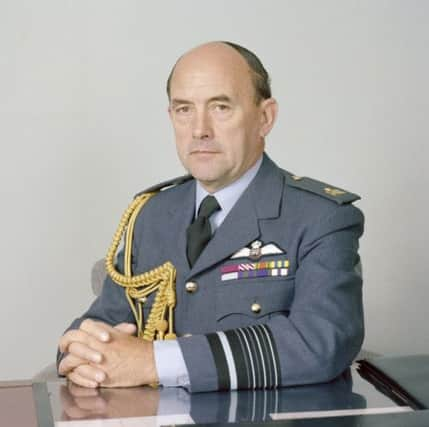Obituary: Air Chief Marshal Sir Jock Kennedy, AFC (and bar), pilot


During the Cold War Air Chief Marshal Sir Jock Kennedy played a crucial role in transporting vital materials to several distressed areas. Soon after graduating as a pilot Kennedy flew Hastings aircrafts on the hazardous Berlin Air Lift in 1948/49. The event was one of the first major crises of the Cold War. The Soviets, without warning, blocked the Allies’ railway, road and canal access to the city, thus closing all supply routes for the citizens’ essential food and fuel supplies. In response, the Allies, with great skill and ingenuity, organised an airlift, in which the RAF played a decisive role. Kennedy and his colleagues flew more than 200,000 flights in one year.
Fifteen years later Kennedy was again involved in a mercy mission, this time flying supplies into Zambia following Prime Minister Ian Smith’s Unilateral Declaration of Independence in Southern Rhodesia in 1965. Both assignments required exceptional flying abilities and immense tact and discretion as both took place under extremely sensitive conditions.
Advertisement
Hide AdAdvertisement
Hide AdThomas Lawrie Kennedy (invariably known as Jock to friends and RAF colleagues) was educated at Hawick High School. In 1946 he did his National Service in the RAF as an airman and then attended Cranwell College. Kennedy proved a most talented pupil and was awarded the Philip Sassoon Memorial Prize for best all-round cadet.
He joined No 297 Squadron, flying Hastings aircrafts and was immediately made operational for service on the Berlin Airlift. Kennedy principally flew supplies into Berlin from the RAF’s airfield at Gatow just to the south west of the city. It was unrelenting and the supply aircrafts flew many missions a day. Dakotas flew supplies into Gatow and the RAF then transported a staggering 995 tons of supplies per day into Berlin.
By early 1949 Kennedy and his colleagues had built up such an efficient system that in May the Soviets, to their considerable embarrassment, called off the blockade.
After some years serving as a captain in the VIP squadron Kennedy and his squadron flew bombing missions over Egypt during the Suez crisis.
For three years from 1957 he served as a senior pilot at the Royal Radar Establishment, where he tested bombing radars and electronic aids installed in a Valiant and a Canberra. He was awarded a Bar to his AFC.
In 1965 Kennedy was commanding the RAF station at Brize Norton when he was ordered to fly his Britannia aircraft immediately to Tanzania and Kenya. Rhodesia suspended all oil transfers from its refineries into Zambia so the UK began the airlift. In the House of Commons a minister stated that the first supplies of oil were flown into Zambia by RAF Britannias within 48 hours of the announcement of the oil embargo. Kennedy, who spent some months in Nairobi commanding the RAF detachment, again won praise for his handling of a tricky and demanding operation.
In 1970 he was promoted to Group Captain and after tours of duty as station commander at Brize Norton and as Deputy Commandant of the RAF Staff College Kennedy, in 1977, was appointed Commander of the Northern Maritime Region, with headquarters at Pitreavie Castle in Fife.
It was another posting which required a keen awareness of political affairs. During the Second World War Pitreavie was converted into an underground bunker. During the Cold War it remained in service, partly because of its proximity to Rosyth, and was the principal maritime control centre in Scotland. In a dire emergency Kennedy would have controlled all Nato forces operating between the North Sea and the North Pole. He was also responsible for all the monitoring in the North Sea – including all Soviet shipping and submarine activity.
Advertisement
Hide AdAdvertisement
Hide AdHis final appointment was with the Air Force Board as the Air Member for Personnel. He retired in 1986, sat on the board of Dowty & Co, and became a most active and committed Controller of the RAF Benevolent Fund.
Kennedy inaugurated a particularly imaginative scheme to celebrate the 50th anniversary of the Battle of Britain. He launched a £20 million appeal, suitably named Reach For the Sky, in conjunction with the Fairford Air Tattoo, which raised well over the targeted sum.
Kennedy was a man much admired and respected throughout the RAF – colleagues remember him as “an outstanding officer”. He was appointed CB in 1978 and KCB in 1980. He served as Air ADC to the Queen (1983–86).
Kennedy remained active after his retirement in Rutland. He was a keen golfer and sailor and served as Lord Lieutenant for the county and as Deputy Lieutenant of Leicestershire.
Jock Kennedy married Margaret Parker in 1959. She and their son and two daughters survive him.